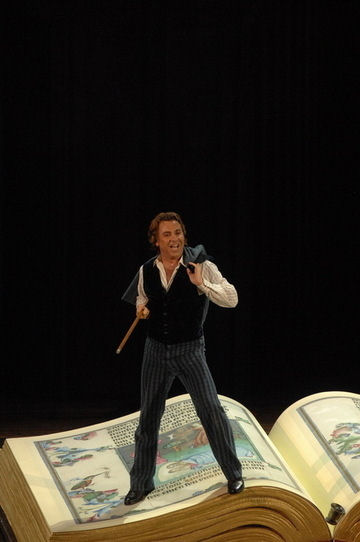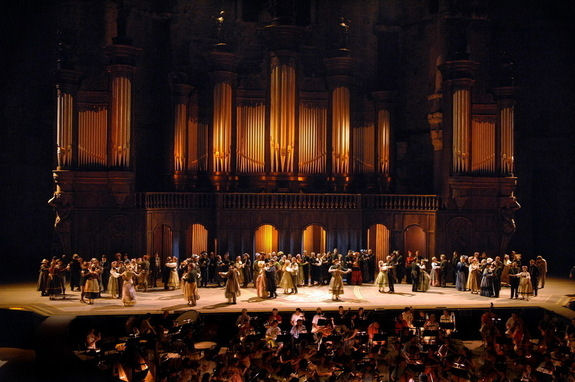Other Links
Editorial Board
- Editor - Bill Kenny
- London Editor-Melanie Eskenazi
- Founder - Len Mullenger
Google Site Search
SEEN
AND HEARD INTERNATIONAL OPERA REVIEW
Gounod, Faust:
Production from Théâtre
du Capitole de Toulouse, Nicolas Joël
stage director. Soloists and chorus Les Chorégies d'Orange, Orchestre Philharmonique de Radio France
conducted by Michel Plasson. Théâtre Antique, Orange, France. 2.
8.2008 (MM)
Opera can be magic in Orange, and magical it was last Saturday
when tenorissimo Roberto Alagna hobbled onto the stage as
the old Faust, made his famous, if regrettable deal and
cart-wheeled off the stage, in fine vocal form as well - can
there be any doubt that this forty-five year old French tenor has
made a pact with some supernatural force?
Conductors at Orange are like singers at Orange - you have heard
of them, they are well-known, even famous. And frankly you
specifically hear them in Orange because they are a big part of
the show. The venerable, seventy-five year old, Michel Plasson
(as big a star in the conducting world as Alagna is in the tenor
firmament), brought Gounod's chestnut to a consistent gently
boiling point, suffusing the old tunes with the verve of an
Offenbach operetta, a perfect balance of tongue-in-cheek and the
truly melodramatic.

Roberto Alagna as Faust
Needless to say, opera in Orange's huge Théâtre Antique is about
big singing, and as usual the Chorégies d'Orange did not
disappoint. Albanian soprano Inva Mula rendered Margarite in
vocally perfect terms, her splendid musicianship bringing fresh
life to Margarite's tired, too-often-heard arias, her frail
physique belying the physical force she brings to Gounod's too
easily seduced then tortured heroine. Red-suited German
bass-baritone René Pape made a dashing, absolutely irresistible
Mephistopheles, and Canadian baritone Jean-François Lapointe, a
world-famous Pelléas, stated his case as one of the world's great
Valentins.
It was sheer pleasure to hear Alagna deliver Gounod's cantabile
musical lines full-throated, but not with his familiar Italianate
spinto. While it was a little shaky up there on the high C
he did hit it, even if he did not hold it as long as we
devotees might have wished. Finally it was not his best night
vocally - perhaps he was suffering from a cold - though this did
not diminish his, or the crowd's enthusiasm. Gounod's opera is
really about Margarite, and as Mme. Mula deserved, her fabulous
Margarite earned the evening's major ovation.
Unlikely as it is, opera at Orange's old Roman theater can be
about the orchestra, the Orchestre Philharmonique de Radio France

The Stage Set
There was a time, not even so long ago, when Orange
experimented with interesting stage directors. No more. In
recent years productions have been farmed out to the directorial
mafia of local Southern French opera houses. This Faust
was identified as a co-production with the
Théâtre du Capitole de Toulouse
meaning that it was Nicolas Joël's familiar old production (the
huge book prop, a tenor Siebel on crutches, etc.) goosed up to
fill the huge Orange stage.
There was no scenery, the stage dominated the entire evening by
one gigantic prop - a super-sized pipe organ, utilized,
needless-to-say by Mephistopheles in his sacrilegious exchange
with Margarite in the church. Costumes were of Gounod's, not
Faust's time, and lighting was nearly always an eerie blue, corny
and effective. Not yet verismo, Gounod's essay into
nineteenth century melodrama (a vulnerable young girl is seduced
and pays a high price) seemed a true operatic masterpiece in
Orange, equaling in artistic stature Goethe's eighteenth century
philosophic masterpiece. (May we bask in this questionable thought
for a couple of minutes?).
Michael Milenski
Photos © Philippe Gromelle - Orange
Back to Top Cumulative Index Page
